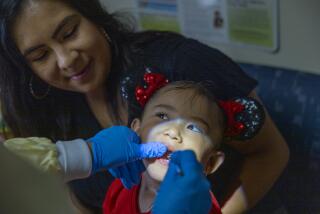F. Gene Dixon, 84; led efforts to create dental insurance
- Share via
Dr. F. Gene Dixon, a dentist who helped make dental insurance accessible to millions of Americans with the founding of the company now known as Delta Dental of California, has died. He was 84.
Dixon fell on the driveway outside his house in San Mateo, Calif., causing a head injury, said his wife, Rosemary Dixon. He died at a hospital the next day, Oct. 26.
Though dental insurance is now a popular employee benefit, Dixon began his work at a time when most had not even heard of it.
“The very idea was unprecedented,” Dixon said in a 1993 speech at the University of Nebraska Medical Center’s College of Dentistry. “The insurance companies were saying that dentistry was uninsurable and the proof of this was that not a single insurer would offer it.”
That began to change in the 1950s with a nudge from organized labor. In 1954, the president of the International Longshore and Warehouse Union announced to the dental community in the states of Washington, Oregon and California that it was making $750,000 available to provide dental care to union members’ children.
Union officials approached dental associations in those states for help in setting up a prepaid, free-choice dental care program patterned after the medical insurance model.
The California Dental Assn. accepted the challenge in 1955 and eventually asked Dixon to run the program. Dixon had a private practice in San Mateo and through the San Mateo County Dental Society had set up a small program that offered dental care to welfare recipients, both of which helped prepare him for the work of designing and running the new program.
Under the plan, patients were free to choose from among a broad network of dentists who agreed to limit their fees and follow other guidelines. By creating big networks “you create a situation where the charges are limited so the patients can afford co-payments and the companies that buy it can afford the premiums,” said Gary D. Radine, president and chief executive of Delta Dental.
Dixon saw it as a means of improving dental care by increasing access. Others saw it differently.
“It was a controversial thing,” Rosemary Dixon said. “Not everybody accepted that readily. They did not like a third-party intervention in a private practice.”
By the 1960s, the program had separated from the California Dental Assn. Unions representing various professions, including aerospace, teachers and retail clerks, were interested in offering dental coverage in benefits packages. As the company won converts, “it set the stage for what was to happen in the early 1960s, when a trend began on the West Coast that would, over a 10-year period, engulf the entire United States,” Dixon said in the 1993 speech.
Helping to reshape the business side of the dental industry was not an early goal for Dixon. Born April 13, 1923, in Superior, Neb., he graduated from the University of Nebraska Medical Center’s College of Dentistry in 1947 and served three tours of duty in the Navy during World War II and the Korean War.
After being discharged, he went into private practice in November 1952. In the early years of running the new venture, Dixon had a sense of being in untested waters. Everything he did was an experiment, he said, “which can be unnerving when you’re in the business of managing risk.
“You see, what we were trying to do -- and what truly made this whole enterprise exciting -- was to spawn a partnership between ourselves and the dental providers for the benefit of the public,” he said. “We weren’t aiming to supplant the traditional financial relationship between dentist and patient, but rather to make dental care available to people who would never have otherwise visited a dentist, or who might not have sought dental care until a major problem developed.”
In 1977, Dixon retired as chief executive of Delta Dental, but many of the practices he initiated continue today. The number of people with dental plans in the U.S. has expanded to about 170 million, Radine said.
“That’s what he was the forerunner of,” Radine said.
In addition to his wife, Dixon is survived by five children, Donald Dixon of Champaign, Ill.; Alicia Dixon Docter of Seattle; Barry Dixon of Montana; Sally White of Tehachapi; and Kathryn Dixon of London; as well as five grandchildren and his stepmother, Bobbie Dixon of San Mateo.
Memorial donations may be sent to the University of Nebraska Foundation, 1010 Lincoln Mall, Suite 300, Lincoln, NE 68508.
--
jocelyn.stewart@ latimes.com
More to Read
Sign up for Essential California
The most important California stories and recommendations in your inbox every morning.
You may occasionally receive promotional content from the Los Angeles Times.










